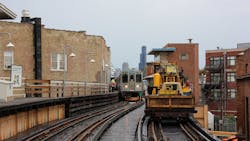Rebuild Illinois bill passes; state transit projects to see funding infusion
Illinois legislators concluded their spring session on Sunday, June 1, by passing a six-year, $45 billion infrastructure bill. The state has not passed a capital bill this comprehensive since 2009 and the bill will support Illinois Gov. J.B. Pritzker’s Rebuild Illinois plan, which he said would put the state on a path toward repair.
According to Illinois State Sen. Martin A. Sandoval (D-11), the plan includes a modernization of Illinois’ motor fuel tax, which has not seen an update since 1990. The motor fuel tax will also be indexed to inflation to ensure that the state will have a sustainable revenue source to maintain its roads and bridges far into the future.
“We’ve been underfunding our transportation system for decades and it’s time to step up and take serious action to make Illinois a leader in this category,” Sandoval said. “Millions of people use our transportation system on a daily basis and we can’t afford to wait any longer to perform maintenance that keeps them safe.”
Gov. Pritzker will sign the legislation and called its passing a “historic step forward.”
“After years of neglecting our state's roads, bridges, mass transit and buildings, Illinoisans' health and safety have been jeopardized, and job creation has been hindered. I'm proud that the state is on the verge of adopting a bipartisan infrastructure plan for the first time in a decade. Our plan to rebuild our roads, bridges and communities will create hundreds of thousands of jobs throughout our state. The Rebuild Illinois plan will reinvigorate our economy and strengthen our rightful status as the transportation and supply chain hub of the nation,” said the governor.
The bill includes more than $5 billion for passenger rail and mass transit systems in the state. The Regional Transportation Authority will see $3.6 billion total, which consists of $2.23 billion from the Multi-Modal 3 Transportation Bond Fund and $1.367 billion from the Regional 15 Transportation Authority Capital Improvement Fund.
RTA will be able to help fund the following:
- $100 Million Kendall County Metra Rail Extension
- $60 million Green Line Cottage Grove Station Repairs
- $8 million Harvey Transportation Center Improvements
- $31.5 million for the Chicago Transit Authority (CTA) Blue Line O’Hare Branch improvement
- $50 million CTA tactical traction power to the Blue Line O’Hare Branch
- $220 million in capital upgrades for Pace
Downstate transit agencies were allocated more than $355 million to support their activities including $96 million for a Metro Link Extension from Scott Air Force Base to MidAmerica Airport.
Intercity passenger rail service and improvements include:
- $225 million for the Quad Cities Passenger Rail Project
- $275 million for the Chicago to Rockford Intercity Passenger Rail expansion
- $100 million for Chicago to Carbondale Passenger Rail Improvements
- $122 million for the Springfield Rail Improvement Project
In other rail project news, the bill provides $78 million to be used to improve grade crossing safety and the Chicago Region Environmental and Transportation Efficiency (CREATE) program, which aims to improve the speed of freight and passenger rail traffic around and through the Chicago region was given $400 million.
Additional transit related projects to make mention in the legislation include:
- $39,000 for the city of Chicago to make capital improvements to the North Park Senior bus shelter in the 39th Ward.
- $75,000 City of Wooddale for lighting improvements at mass transit station
- $250,000 for infrastructure improvements for Rockford Mass Transit
- $51,000 to Village of Hazelcrest for costs associated with transit development
- $3 million to Connect Transit for transit transfer center costs
- $70 million to support electric vehicle infrastructure
RTA Director of Marketing and Communications Susan Massel said the details of the bill are being reviewed, but RTA is pleased to see the state legislature and Gov. Pritzker understand the importance of capital funding for transit and transportation in Illinois.
"We are heartened to see that in addition to the $2.7 billion allocated for transit capital funding through bonding, there is also annual, sustainable revenue or 'pay as you go' funding, allocated for public transportation capital funding . This is the type of long-term, stable capital funding that public transportation needs and riders deserve to address our long term capital need of $30 billion over the next decade," said Massel.
Once the governor has signed the bill, it will take effect on July 1, 2019.
About the Author

Mischa Wanek-Libman
Group Editorial Director
Mischa Wanek-Libman is director of communications with Transdev North America. She has more than 20 years of experience working in the transportation industry covering construction projects, engineering challenges, transit and rail operations and best practices.
Wanek-Libman has held top editorial positions at freight rail and public transportation business-to-business publications including as editor-in-chief and editorial director of Mass Transit from 2018-2024. She has been recognized for editorial excellence through her individual work, as well as for collaborative content.
She is an active member of the American Public Transportation Association's Marketing and Communications Committee and served 14 years as a Board Observer on the National Railroad Construction and Maintenance Association (NRC) Board of Directors.
She is a graduate of Drake University in Des Moines, Iowa, where she earned a Bachelor of Arts degree in Journalism and Mass Communication.
